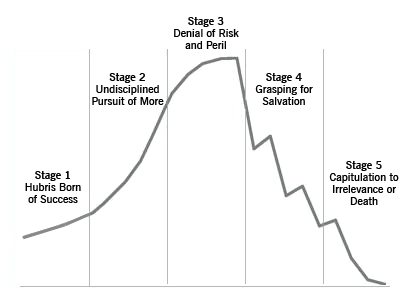the five steps to failure and three warning signs cpas cannot ignore. how are cpas handling the new economic realities? join the survey; get the answers.
by rick telberg
at large

if there were only three financial metrics you needed to look at, what would they be?
revenues? profits? growth? market share? roi?
maybe, but none are as predictive of a good company headed for flameout than the three that bestselling author jim collins has found for cpas and finance managers.
in “how the mighty fall,” best-selling author jim collins revisits several companies that went from good to great to the brink of failure. the lessons for cpas and finance managers are stark and simple.
|
how are cpas handling the new economic reality? sound off here: join the survey; get the results. (free. confidential.) |
collins seeks to find the common threads in the case studies of companies which once seemed paragons of success – before they collapsed in flames. the names today are legion: bear stearns, lehman, fannie and freddie, and merrill and wamu. but the lessons go beyond the latest bubble and crash. he also writes about hp, motorola, circuit city, a&p, addressograph, ames department stores, bank of america, merck, rubbermaid, scott paper and zenith electronics.
leadership, by the way, is the central topic of the tuesday, july 14, webinar at 1pm with jean caragher of capstone marketing. it’s part of our seven-part series: the seven keys to success in cpa firm management, on sale here.
having studied both how companies become great and how companies fail, collins concludes, “there are more ways to fail than to become great.” it echoes tolstoy: “all happy families are alike; each unhappy family is unhappy in its own way.”
collins identifies five stages of decline:
stage 1: hubris born of success
stage 2: undisciplined pursuit of more
stage 3: denial of risk and peril
stage 4: grasping for salvation
stage 5: capitulation to irrelevance or death.
in the first stage, a company’s success may already be planting the seeds of its own destruction. many companies, according to collins, fail to understand exactly why they are successful. they come to rely on what he calls “the rhetoric of success,” which sounds like “we’re successful because we do these specific things.”
but that reading is wrong. collins sees great companies building sustainable success by replacing the “rhetoric” with “penetrating understanding and insight.” these exceptional companies understand exactly “why” they do some specific things and “under what conditions they would no longer work.”
“luck and chance,” collins says, “play a role in many successful outcomes and those who fail to acknowledge the role they may have played in their success – and thereby overestimate their own merit and capabilities – have succumbed to hubris.”

from stage 1 hubris, great companies destined for failure fall next into stage 2, the undisciplined pursuit of more – more scale, more growth, more acclaim, “more of whatever those in power see as ‘success.'” more than anything else, this is where companies overextend themselves or overreach in an effort to achieve even greater things.
too often, collins says, they have failed to understand what made them great to begin with. to be sure, complacency and simple resistance to change can set up a successful company for failure. but the most spectacular and predictable failures flow from hubris in stage 1 and overreaching in stage 2.
all is salvageable, however, until stage 3 sets in – denial of risk and peril. this is very much the last chance for a company’s leadership to gain control of the situation, inject some judiciousness and reverse what otherwise would be an inevitable and inevitably rapid decline. stage 3 is at the edge of the cliff, where management has a last chance to peer into the abyss and decide to pull back. alas, if a company is already suffering from hubris and if it has already overreached, few leadership teams change course in stage 3.
the problem is that all the external signals are still flashing green – rising stock prices, advancing revenues, gains in market share, laudatory articles in the business press, toasts and roasts at local civic associations.
yet the internal warning signs are by now clear in stage 3. the signals should be especially understandable by cpas and finance managers.
collins breaks down the warning signs to a surprising list of just three:
- deterioration in gross margins,
- current ratio or
- debt-to-equity ratio.
is it really that simple? well, not completely, but for finance and accounting managers, the numbers should be clear as a bell. customer loyalty and stakeholder engagement could be added to the list, but neither is as clear, as early in a company’s decline.
collins’ financial analysis reveals that “all 11 fallen companies showed a negative trend in at least one of these three variables” as they moved toward their flameouts. “yet, we found little evidence of significant management concern and certainly not the productive paranoia they should have had about these trends.”
the role of the cpa and finance manager is clear – to bring forth the unpleasant facts, and keep talking about the facts until management listens.
what if management isn’t listening? or doesn’t want to hear bad news? well, in that case, the cpa canon is clear. you wouldn’t be the first to conclude that working for a delusional company is both bad practice and bad business.
how are cpas handling the new economic reality? sound off here: join the survey; get the results.
comment: send an e-mail to rick telberg.
follow: get my daily news and trends updates: follow me on twitter. (what’s twitter?)
one response to “is your company headed for a flameout?”
tom hood
rick,
you are starting to scare me – every time i get ready to write a post, you seem to be covering the same topic! great stuff – i have been a fan of jim collins since working on the cpa vision project and having a chance to meet him years ago. i am about halfway through his newest book and you covered it well.
having come from a cfo spot in a tough industry, your three warning signs for cfos and cpas are on point and great advice. soemthing all cpas can use to get their client’s attention or ceo if you are in biz/industry.
keep up the great work!
tom